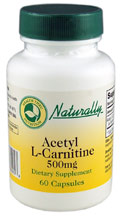Acetyl-L-Carnitine
Carnitine is the generic term for a number of compounds that include L-carnitine, acetyl-L-carnitine, and L-propionyl carnitine. Carnitine is termed a conditionally essential nutrient, as under certain conditions its requirements may exceed the individual’s capacity to synthesize it. Carnitine mediates the transport of medium/long-chain fatty acids across mitochondrial membranes, facilitating their oxidation with subsequent energy production; in addition, it facilitates the transport of intermediate toxic compounds out of the mitochondria preventing their accumulation. Because of these key functions, carnitine is concentrated in tissues that utilize fatty acids as their primary dietary fuel, such as skeletal and cardiac (heart) muscle.
Neuroprotection:
Since elevated free radical generation and other mitochondrial dysfunction are involved in neurodegenerative pathology, substances that support mitochondrial function and block free radical reactions from propagating represent reasonable candidates for chemopreventive or therapeutic treatment of these disorders. Acetyl L-carnitine and its non-acetylated derivative, L-carnitine, are both integral components of mitochondrial function. These substances facilitate the transport of long chain fatty acids into the mitochondria to generate the oxidative phosyphorylation substrates NADH and FADH2, and the removal of short chain and medium chain fatty acids that accumulate during normal and abnormal metabolism. Experimental evidence suggests that acetyl-L-carnitine boosts mitochondrial ATP production and also helps protect mitochondria against oxidative attack. The improvement of mitochondrial respiration allows neurons to produce the ATP necessary to maintain the normal membrane potential and delays mitochondrial depolarization in response to a variety of stressors including oxidative damage
The Dynamic Duo: Acetyl-L-carnitine and Alpha Lipoic Acid
A decline in mitochondrial function is thought to be major contributor to the aging process. Tissue L-carnitine levels also decline with age. Further, mitochondrial decay increases oxidative damage to proteins with age, leading to structural deformation of key enzymes and decreased affinity for the enzyme’s substrate. It has been shown in studies with old rats, this decay can be reversed by supplementation with acetyl-carnitine and alpha-lipoic acid. Moreover, supplementation with a combination of the two was found to be more effective than the use of either compound alone.
Halting Mitochondrial Deterioration:
In a study reported in Neurochemical Research, researchers from the University of California investigated mitochondrial decay and oxidative damage by examining the activity of the mitochondria in the brains of young and old rats, as well as old rats fed with alpha lipoic acid and acetyl L-carnitine (LA/ALC).
The brain mitochondria of the old rats, compared with that of the young rats, had significantly lower levels of naturally present antioxidants, had more oxidative damage to fats and proteins, and overall decreased activity. Feeding LA/ALC to the old rats partially restored age-associated mitochondrial dysfunction to the levels had by the young rats. These results document that mitochondria decay plays an important role in brain aging.
Interest in LA/ALC has been increasing since researchers at the Linus Pauling Institute at Oregon State University found that activity, energy and cognition could be improved by adding the compounds to the diet. Lead researcher Tory Hagen says that after just a month, older rats on the supplement were about twice as active as older rats not supplemented, whose activity was minimal.
Acetyl-L-carnitine has a rather unique property in that it is able to cross the blood brain barrier (taken up by the brain) and thus has an important role in brain function. It has better bioavailability than L-carnitine. There is evidence to show that acetyl-L-carnitine supplementation may be beneficial in preventing age-related declines in energy metabolism and memory.
These statements have not been evaluated by the FDA. This product is not intended to diagnose, treat, cure or prevent any disease.



